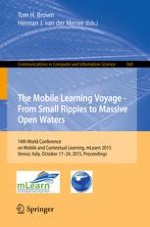2015 | OriginalPaper | Buchkapitel
Small Talk Versus Smart Talk: Providing Accounting Content and Emotional Support in a Distance Education Course
verfasst von : Annelien A. van Rooyen, Jacobus S. Wessels
Erschienen in: The Mobile Learning Voyage - From Small Ripples to Massive Open Waters
Aktivieren Sie unsere intelligente Suche, um passende Fachinhalte oder Patente zu finden.
Wählen Sie Textabschnitte aus um mit Künstlicher Intelligenz passenden Patente zu finden. powered by
Markieren Sie Textabschnitte, um KI-gestützt weitere passende Inhalte zu finden. powered by
